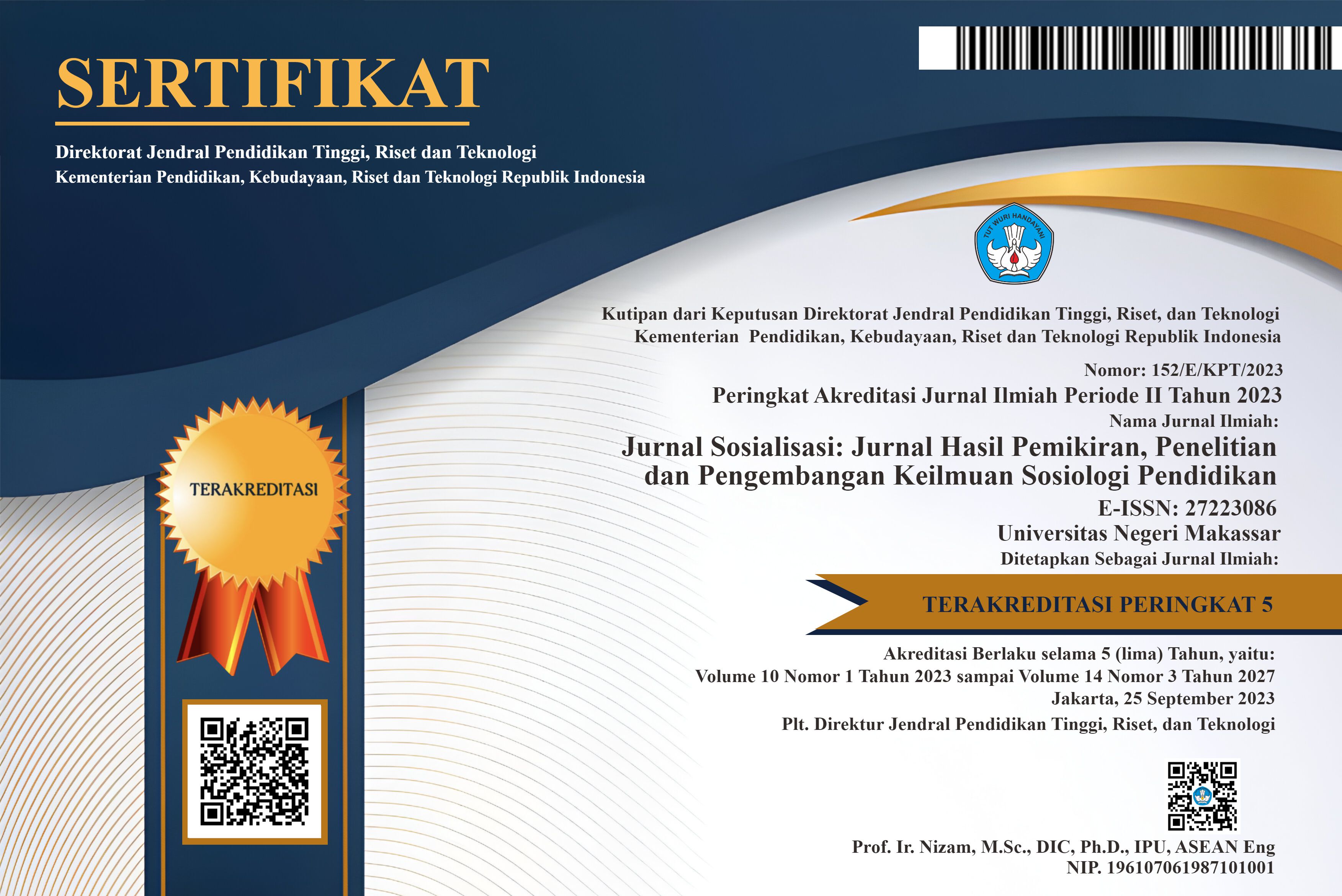Animal Care and Ethics in Contemporary Religious Debates
(1) Department of Religious Studies and Philosophy, Delta State University, Abraka, Delta State.
(2) Department of Religious Studies and Philosophy, Delta State University, Abraka, Delta State.
(*) Corresponding Author
DOI: https://doi.org/10.26858/sosialisasi.v1i1.22565
Abstract
Keywords
Full Text:
PDFReferences
Akpan, C. O., Ogar, J. N., & Bassey, S. A. (2020). Examining the Ethics of Research in Animal Experimentation. Bulletin of Pure and Applied Sciences, 39a(1).
Andrew, E. H. (2006). Contemporary dimensions of interaction between art and technology: implications for stage and media designs. Global Journal of Humanities, 5(1), 31-34.
Andrew, E. H. (2014). The Restrictions of the Modern Proscenium Stage on Traditional African Values. Cajolis: Calabar Journal of Liberal Studies, 7(2), 114-127.
Bassey, S. A., (2020), Technology, Environmental Sustainability and the Ethics of Anthropoholism. Przestrzeń Społeczna, 1(19).
Burtt, E. A. (1955). The Teachings of the Compassionate Buddha ; Early Discourses, the Dhammapada, and Later Basic Writings. New York; New American Library.
Denny, F. M. (1987). Islam and the Muslim Community. San Francisco ; Harper SanFrancisco.
Dorzhigushaeva, O. V., & Kiplyuks, A. V. (2020). Environmental ethics of Buddhism. International Journal of Environmental Science and Development, 11(3), 154–158.
Dursun, S., & Mankolli, H. (2021). The Value of Nature: Virtue Ethics Perspective. GNOSI: An Interdisciplinary Journal of Human Theory and Praxis, 4(1 (May)), 1-15.
Esposito, J. L. (1988).Islam ; The Straight Path. Oxford; Oxford U.
Faria, C., &Paez, E. (2014). Anthropocentrism and speciesism: conceptual and normative issues. Revista de Bioética Y Derecho, 32, 95–103.
Gupta, B. (2006). Bhagavad G?Tā As Duty And Virtue Ethics. Journal of Religious Ethics, 34(3), 373–395.
Harris, I. (1997). Buddhism and the Discourse of Environmental Concern; Some Methodological Problems Considered. Cambridge, Harvard U.
Jacobsen, K. A. (2003). Hinduism and Ecology. Environmental Ethics, 25(3), 333–336.
Kokolus, C. C. (2008). Encyclopedia of Religious and Spiritual Development. Theological Librarianship, 1(2), 86–87.
Mbum, P. A., Oben, B., & Ighoteguonor, E. G. (2014). Empirical study on global marketing flows and Nigerian economic growth perspective. Journal of International Business and Economics, 2(4),
-162.
Ogar, J. N., Asira, A. E., & Bassey, E. I. (2021). Land Ethic According to the Biblical Book of Genesis and Isaiah. GNOSI: An Interdisciplinary Journal of Human Theory and Praxis, 4(1 (May)), 16-30.
Ogar, J. N., Emina, K. A., & Bassey, S. A. (2020). An Ethical Overview of Animal Welfare and the Use of Antibiotics. Bulletin of Pure and Applied Sciences, 39a(1).
Osuala, A. N., & Nyok, E.-I. E. (2020). New Twist to Political Corruption in 4th Republic Nigeria given Non- Human Animals Stealing millions: A Case for the Defense of Animal Rights. GNOSI: An Interdisciplinary Journal of Human Theory and Praxis, 1(2).
Peterson, A. (2000). In and of the world? Christian theological anthropology and environmental ethics. Journal of Agricultural and Environmental Ethics, 12(3), 237–261.
Peterson, A. L. (2002). Christianity and Ecology. Environmental Ethics, 24(1), 105–108.
Ravikanth, G. (2021). Indian Philosophy and Environmental Ethics. GNOSI: An Interdisciplinary Journal of Human Theory and Praxis, 4(1(May), 47-63.
Rosenfeld, D. L. (2019). Ethical Motivation and Vegetarian Dieting: The Underlying Role of Anti-speciesist Attitudes. Anthrozoos, 32(6), 785–796.
Simon, P. J. (2007). Against Holism:Rethinking Buddhist Environmental Ethics. Environmental Values, 16(4), 447–461.
Udoudom, M. (2021). The Value of Nature: Utilitarian Perspective. GNOSI: An Interdisciplinary Journal of Human Theory and Praxis, 4(1 (May)), 31-46.
Umukoro, G. M., Odey, V. E., & Ndifon, M. M. (2020). Immigration, Otherness, Economic mobility and social inclusion in the homeland. International Journal of Social Sciences and Education, 1(1).
Umukoro, G. M., Odey, V. E., & Yta, E. M. (2020). Tourism Site Infrastructure, Visitor Patronage and Calabar Metropolis. Jurnal Office, 6(2), 97-102.
Van Wieren, G. (2011). Kevin J. O’Brien. An ethics of biodiversity: Christianity, ecology, and the variety of life. Journal of Environmental Studies and Sciences, 1(4), 315–317.
Vodicar, J., & Stala, J. (2018). Monotheism and environmental education. BogoslovniVestnik, 78(2), 415–427.
Article Metrics
Abstract view : 300 times | PDF view : 30 timesRefbacks
- There are currently no refbacks.

This work is licensed under a Creative Commons Attribution 4.0 International License.


































